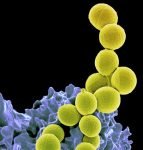Background:
Trillions of tiny organisms-including bacteria, fungi, and viruses-live inside our intestines. These microorganisms break down nutrients in our food, aid our immunity, and help keep us healthy. The population balances among these organisms can vary in different people due to factors including genetics, lifestyle, and diet. More studies are needed to understand how dietary habits affect our intestinal microorganisms.
Objective:
To see how switching from a traditional Western diet (low in fiber, high in saturated fat) to a Mediterranean-like unprocessed foods diet (CLEAN-MED) changes the environment in the intestine. The CLEAN-MED diet includes lots of vegetables, fruits, and whole grains with little sugar or red meat.
Help a Friend
Search the Site
-
Latest Posts
- Conquering Spiritual Trauma from Evangelical Pastor ft. Dr. Laura Anderson November 23, 2023
- Do not purchase or use Neptune’s Fix November 22, 2023
- Be a Citizen Scientist November 7, 2023
- The Grown Man’s Guide to Making and Keeping Friends | SELF September 22, 2023
- If anxiety is in my brain, why is my heart pounding? A psychiatrist explains the neuroscience and physiology of fear September 14, 2023
New Comments







